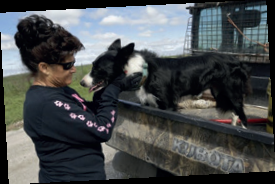Specially Trained Dogs
The demanding daily chores of a farmer were always a little different for Alda Owen. She is legally blind. She is only able to see some blurry shapes and very close objects. But not much else.
It was like that for years on the 260-acre farm she shares with her husband. They live in northwest Missouri. That was until a bull knocked a gate into her. The injury required 60 stitches in her left leg. Owen’s daughter decided her mother needed a helping hand. Or in this case, a wagging tail. It came in the form of Sweet Baby Jo. She is a friendly, energetic border collie.
The pairing was made possible through a nonprofit, or a charity, PHARM Dog USA which stands for Pets Helping Agriculture in Rural Missouri. The organization trains dogs specifically for farmers with disabilities.
“She’s made it possible for me to be a productive person, to keep the life we’ve built,” Owen said of the dog. She got the dog in 2012.
“People think of farmers as rugged and tough,” Allenbrand said. “When you see a big, burly farmer crying after they get a dog because they know they can keep farming, you see what a difference it’s making. That’s what drives us.”
PHARM Dog USA trains the dogs to retrieve tools, carry buckets or open gates. Border collies are trained only to herd and help control cattle and other animals. The farmers never pay for the dogs. The animals are donated or they are rescued from shelters.
It takes about a year to determine if a dog has the intelligence to be a service dog. That’s according to Bobby Miller. He trains border collies. One of them was Sweet Baby Jo. The biggest challenge is matching a farmer’s specific needs with the right dog, said Don McKay. He is an Iowa farmer. He trains border collies.
The emotional support is as important as the work Sweet Baby Jo does, Owen said. Now 62, Owen spent most of her life hiding her disability and staying within a small comfort zone. Since she got Sweet Baby Jo, Owen has started traveling. She speaks at panels about farmers with disabilities. “It gave me back my self-esteem and pride,” Owen said.

